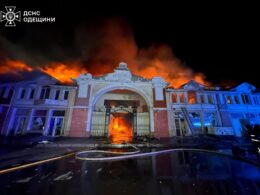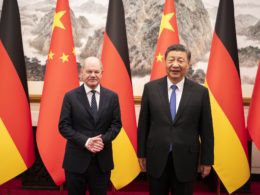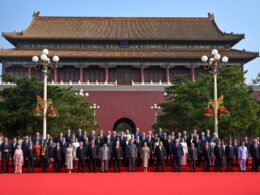The Yermak-Mc Faul group, an international working group on sanctions against Russia, proposes a "Cold War 2.0" approach to make sanctions more effective, which may involve introducing a special trade regime to minimize trade and block access to western technologies until the aggressor country transitions to a peaceful foreign policy.
Its findings were presented in a new report that noted that sanctions had a "disastrous" effect on the Russian economy yet their effect was mitigated by high oil and gas prices, as well as loopholes and exemptions.
To make sanctions more effective, the group proposes:
- to create a unified list of sanctions
- a list of offenders
- a watch list of high-risk companies and individuals
- a traffic light system to assess a country's compliance with the sanctions regime
- to monitor data on Russian trade and improve data sharing between allies.
The report notes that Russian weapons used against Ukraine contain components produced in the USA, the Netherlands, Germany, Switzerland, Japan, China and Taiwan. Namely: Mesit ASD S.R.O (Czech Republic), VKG Oil (Estonia), Nautech Electronics or SBIS Technology (Russia), Amkor Technologies (USA supplies products through the Philippine division), TaT Technologies (Israel), Shenzhen Baoshi Technologies Co Ltd (PRC), Schaeffler Aerospace Gmbh&Co.Kg (Germany), Esp Safety Pvt Ltd (India), Ningbo Jiangbei Xinye Metal Works Co (PRC), Qingdao Evergreen Machinery Co Ltd (PRC), Binzhou Zili Precision Metal Technology Co Ltd (PRC), Wudi Runxin Stainless Steel Products (PRC), Risbridger (Great Britain), Aeroforge (USA), TOO Zenit-K (Kazakstan), LLC "Kntant-Astana" (Kazakhstan). PJP Tech Co., Ltd (South Korea), Photic Nova Technique inc. (South Korea), POSSIBLE, INC (Japan), Quindago Sources Optics (PRC), Walz Elektronic (Germany), Alta Industries Srl (Italy), JSC "Planar" (Belarus), JSC "Integral" (Belarus), JSC "Peleng" (Belarus), Jema France (France), Valvo Bauelemente Gmbh (Germany), Secret Guardian LTD (Israel), CJSC "Professionalnie setevye sistemy" (Belarus), JSC "KB Display" (Belarus), LLC "Itelsys Bel" (Belarus), JSC "NIIEVM” (Belarus), LLC "Global Photon" (Russia).
It also states that intermediaries are used to conceal the ultimate beneficiaries of funds, oil of Russian origin is blended with oil of another country until the non-Russian component exceeds a threshold level at which point that oil is no longer classified as Russian oil, and a “shadow fleet” of tankers will help Russia evade current and forthcoming oil sanctions.
"Professional advisers who facilitate sanctions evasion should be a primary target for secondary sanctions, including the threat of being barred from practicing for at least several years if they facilitate sanctions violations.
Last but not least, the group proposes that the sanctions coalition draw up a list of violators ("blacklist") of oil transporters, traders, financiers, insurers and technical transport service providers who helped Russia evade the oil embargo," the report states.



